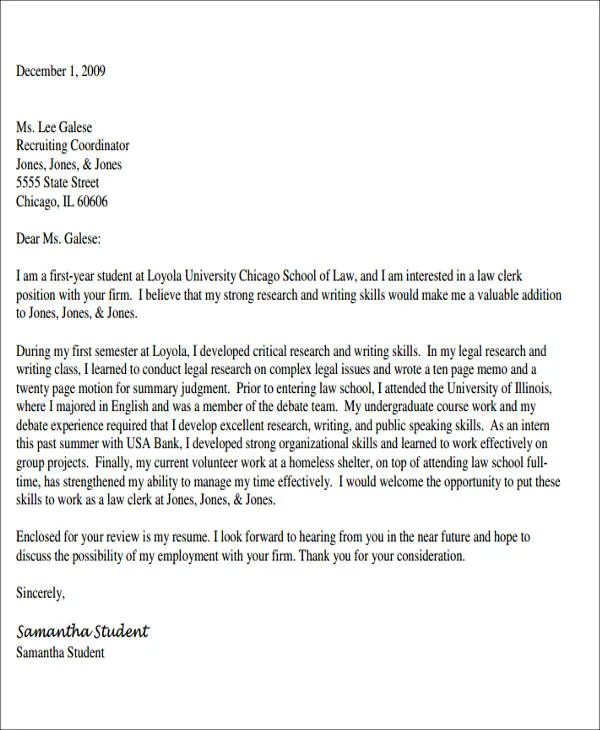Crafting a Winning Legal Assistant Cover Letter
In the competitive world of legal professions, securing a position as a legal assistant requires more than just a stellar resume; it necessitates a compelling cover letter. This document serves as your initial introduction to potential employers, offering you the opportunity to showcase your skills, experience, and personality. A well-crafted cover letter not only highlights your qualifications but also demonstrates your genuine interest in the role and the law firm. This article provides a comprehensive guide, offering insights, tips, and practical examples to help you create a cover letter that impresses and secures you an interview. By understanding the key components and avoiding common pitfalls, you can significantly increase your chances of landing your dream job as a legal assistant.
Understanding the Importance of a Cover Letter
A cover letter is more than just a formality; it is a crucial element of your job application package. While your resume provides a snapshot of your professional history, the cover letter allows you to elaborate on your qualifications, explain your career goals, and express your enthusiasm for the specific opportunity. It’s your chance to connect with the hiring manager on a personal level and articulate why you are the ideal candidate. In today’s job market, a well-written cover letter can set you apart from other applicants. It provides context to your resume, allowing you to highlight the most relevant aspects of your experience and skills as they relate to the specific job requirements. Without a compelling cover letter, your application might not receive the attention it deserves.
Why a Cover Letter Matters
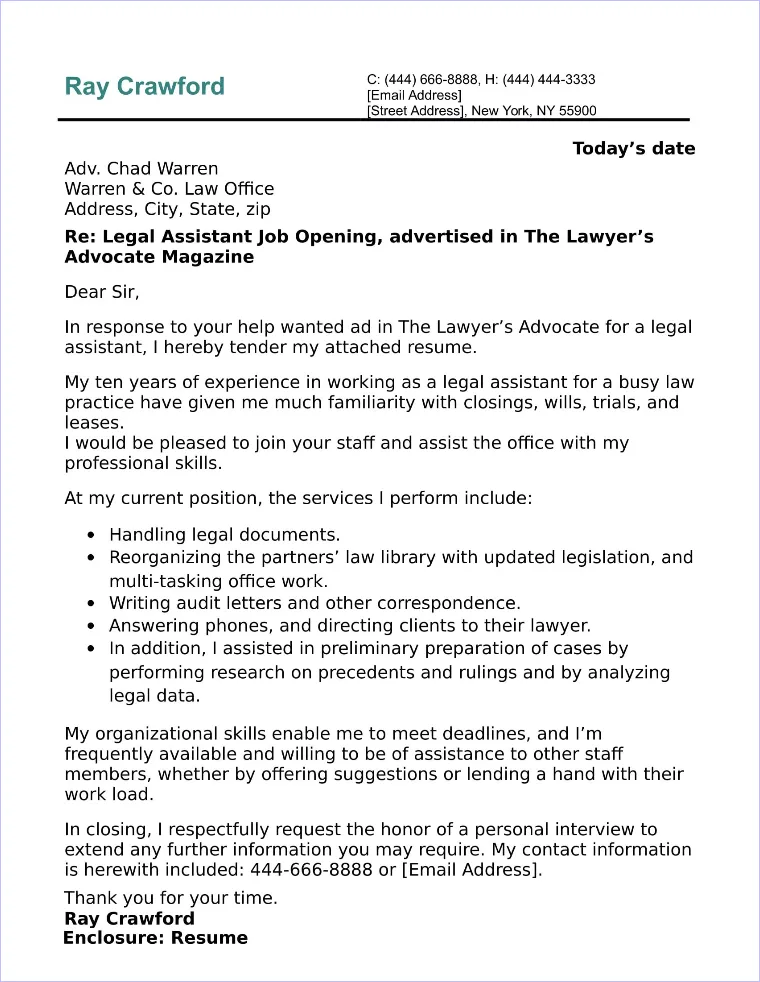
A cover letter allows you to personalize your application, which is something a resume alone cannot achieve. It demonstrates your communication skills, your attention to detail, and your understanding of the role and the law firm. When you tailor your cover letter to the specific job and employer, you showcase your genuine interest, which often makes a significant difference. A well-written cover letter can also help you address any potential weaknesses in your resume. Perhaps you have a gap in your employment history or a lack of experience in a particular area. The cover letter gives you the opportunity to explain these circumstances and emphasize your transferable skills or your eagerness to learn. It is, in essence, your chance to tell your story and to persuade the hiring manager that you are a valuable asset.
Key Elements of a Legal Assistant Cover Letter
A strong cover letter is structured and concise, including several essential elements that contribute to its effectiveness. Each section plays a vital role in conveying your suitability for the position and your professionalism. From the initial contact information to the final signature, every component of your cover letter should be carefully crafted to make a positive impression. Ensuring that each part is accurate and compelling is the first step to showing your application is worthy of serious consideration. This systematic approach to letter writing allows you to highlight the most relevant aspects of your qualifications and demonstrate your commitment to the role.
Contact Information and Date
Begin your cover letter with your contact information, including your full name, address, phone number, and professional email address. This ensures that the hiring manager can easily reach you if they are interested in scheduling an interview. Following your contact information, include the date. This establishes the timeframe of your application and provides a reference point for the employer. Ensuring accuracy in this section is critical, as any errors can reflect poorly on your attention to detail.
Professional Greeting
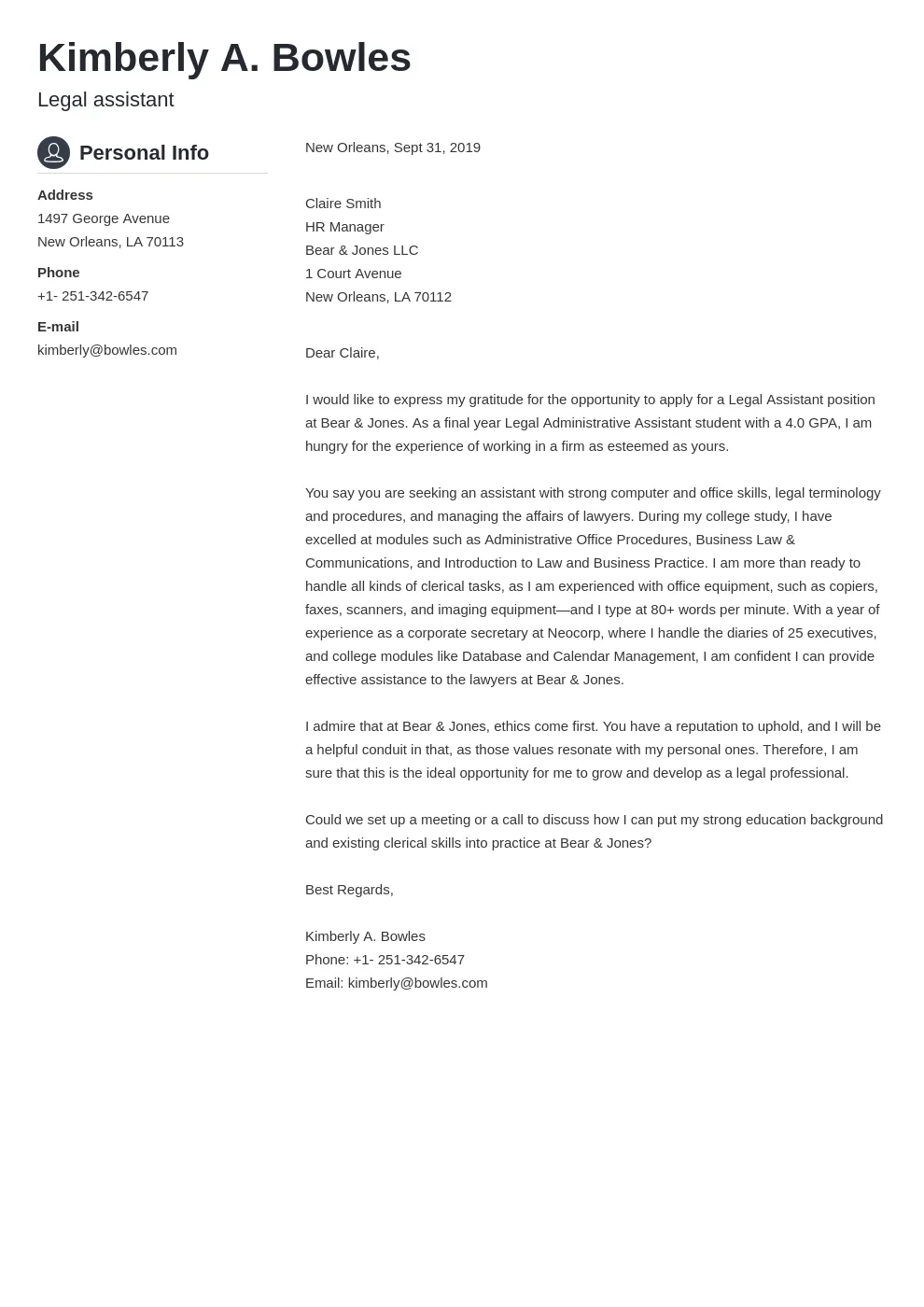
Always address your cover letter to a specific person, if possible. Research the law firm to find the name of the hiring manager or the person responsible for reviewing applications. If you cannot find a specific name, use a professional greeting such as “Dear Hiring Manager” or “Dear [Law Firm Name] Hiring Team.” Avoid generic greetings like “To Whom It May Concern,” as they can make your application seem impersonal. This personalized approach immediately grabs the reader’s attention and demonstrates that you have taken the time to learn about the firm and the role.
Opening Paragraph Captivate the Reader
Your opening paragraph is your chance to make a strong first impression. State the position you are applying for and briefly mention where you found the job posting. Then, immediately capture the reader’s attention by highlighting your key qualifications or expressing your enthusiasm for the opportunity. Consider opening with a compelling sentence that showcases your passion for law or your relevant experience. This initial paragraph sets the tone for the rest of the letter and encourages the reader to continue reading. It shows them that you are serious about the position.
Highlighting Your Skills and Experience
The body of your cover letter is where you provide detailed evidence of your skills and experience, illustrating why you are the best candidate for the job. Tailor your letter to match the requirements outlined in the job description, emphasizing the skills and experiences that align with the position. Provide specific examples that demonstrate your abilities, quantifying your achievements whenever possible. This section should effectively communicate your qualifications and demonstrate your value to the firm.
Relevant Skills for Legal Assistants
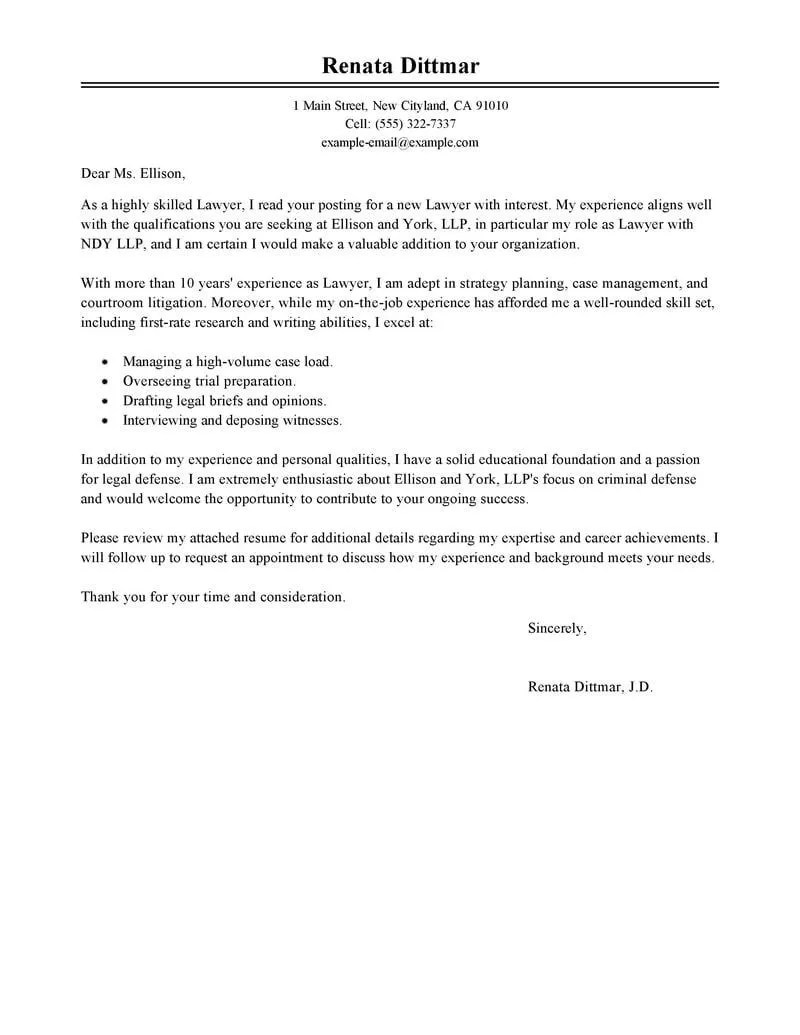
Legal assistants need a diverse set of skills to succeed. Highlight your proficiency in key areas, such as legal research, document preparation, case management, and client communication. Also, emphasize your organizational abilities, attention to detail, and ability to work under pressure. Strong writing and communication skills are crucial. Demonstrate your ability to draft legal documents, manage deadlines, and communicate effectively with clients and colleagues. Mention any specialized software or legal databases you are familiar with, such as Westlaw, LexisNexis, or specific case management systems.
Showcasing Your Experience
Describe your relevant experience, focusing on accomplishments and responsibilities that align with the job requirements. For each position, provide details about your duties, the types of cases you worked on, and the impact of your contributions. Use the STAR method (Situation, Task, Action, Result) to structure your examples, providing specific details about the challenges you faced, the actions you took, and the results you achieved. This structure helps illustrate your skills clearly and concisely, allowing the hiring manager to understand the value you bring to the table.
Quantifying Achievements
Whenever possible, quantify your achievements to provide concrete evidence of your impact. Instead of simply stating that you “managed a large caseload,” mention the number of cases you handled, the number of documents you prepared, or the percentage by which you improved efficiency. For example, “Successfully managed a caseload of 100+ cases simultaneously, ensuring all deadlines were met.” Quantifiable achievements add credibility to your claims and demonstrate your ability to deliver results. They provide tangible evidence of your contributions.
Demonstrating Your Passion and Fit
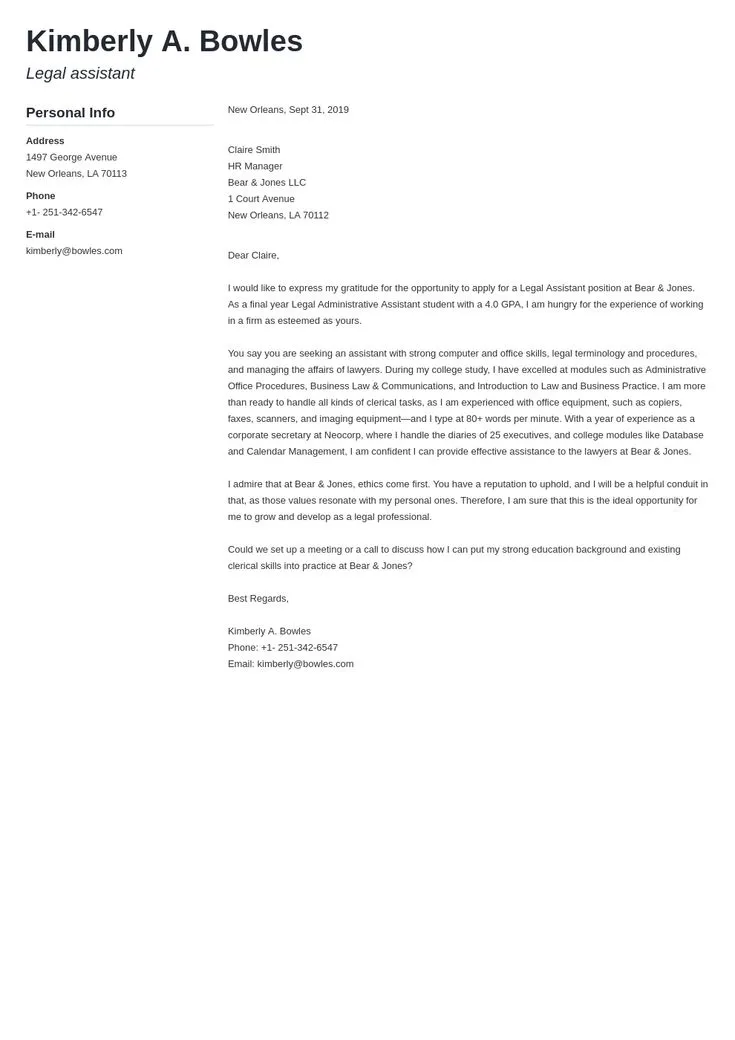
In addition to showcasing your skills and experience, your cover letter should demonstrate your passion for the legal field and your interest in the specific law firm. Expressing enthusiasm shows the hiring manager that you are genuinely interested in the opportunity and that you have taken the time to research the firm and understand its values.
Expressing Your Enthusiasm
Express your enthusiasm for the legal assistant role and the law firm. Explain what attracts you to the position and what motivates you in your legal career. Mention any specific aspects of the firm’s work or culture that resonate with you. Demonstrate your understanding of the firm’s mission and values. Showing your interest is crucial. This will show the hiring manager you are serious about the opportunity, and have taken the time to learn about their business.
Researching the Law Firm
Before writing your cover letter, research the law firm to show your genuine interest. Visit their website, read about their areas of practice, and look for any recent news or achievements. Mention specific aspects of the firm’s work or values that appeal to you. If you know any attorneys or employees, mention them in your letter, as it can help you build a connection. Showing that you have taken the time to learn about the firm is a powerful way to demonstrate your enthusiasm and increase your chances of being considered.
Closing Your Cover Letter
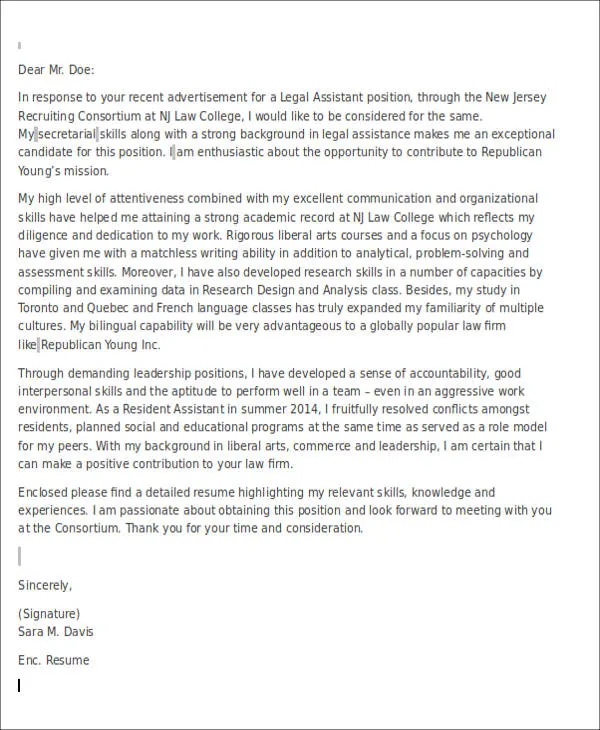
Your closing paragraph should summarize your interest in the position, reiterate your qualifications, and include a clear call to action. It’s your last opportunity to leave a lasting impression and encourage the hiring manager to contact you.
Call to Action
End your cover letter with a clear call to action. State that you are eager to discuss your qualifications further and are available for an interview at their earliest convenience. Provide your contact information again and express your gratitude for their time and consideration. A strong call to action demonstrates your proactive approach and shows your enthusiasm for the opportunity.
Professional Closing and Signature
Use a professional closing such as “Sincerely,” “Respectfully,” or “Best regards.” Then, leave space for your signature if you are submitting a hard copy. If you are submitting an electronic version, type your full name below the closing. Ensure your signature is clear and legible, reflecting your professionalism and attention to detail. A proper signature completes your application and leaves a final, positive impression.
Proofreading and Formatting
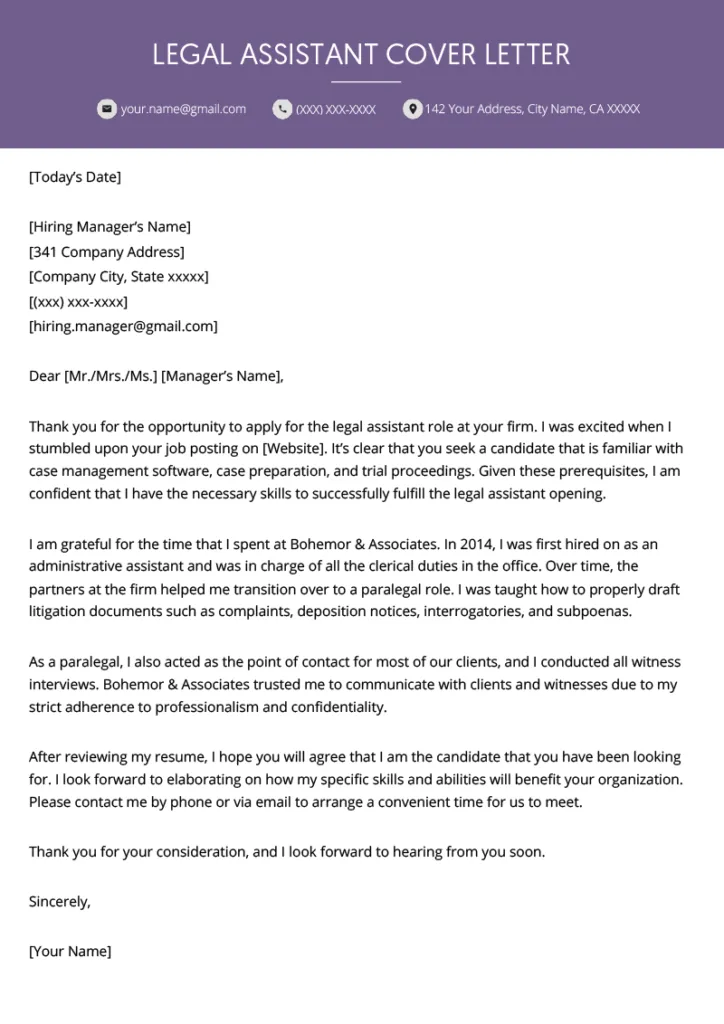
Before submitting your cover letter, carefully proofread it to ensure there are no grammatical errors, spelling mistakes, or formatting issues. Your cover letter is a reflection of your professionalism and attention to detail. Make sure that all the content is error-free. Run your cover letter through a spell checker and grammar checker. Ask a friend or mentor to review it as well. A polished, error-free cover letter demonstrates your commitment to quality and increases your chances of making a positive impression.
Common Mistakes to Avoid
Avoid common mistakes that can diminish your chances of success. Do not use generic templates, as they can make your application seem impersonal. Avoid excessive length; keep your cover letter concise and focused, ideally within one page. Do not include irrelevant information, and always tailor your letter to the specific job description. Avoid negative language or any complaints about previous employers. Pay close attention to details. These actions help ensure your cover letter is strong.
Tips for a Standout Cover Letter
To make your cover letter stand out, tailor it to each job you apply for. Highlight your unique skills and experiences, and use strong action verbs to describe your accomplishments. Showcase your personality, and let your enthusiasm shine through. Use a professional tone and formatting that is easy to read. Proofread carefully to eliminate any errors. Following these tips can significantly enhance your chances of landing an interview and securing your desired position as a legal assistant. By combining these tips with the elements outlined above, you’ll craft a compelling application.
In conclusion, a well-crafted cover letter is a vital tool for any aspiring legal assistant. By understanding the key elements, highlighting your skills and experience, demonstrating your passion, and following best practices, you can create a cover letter that grabs the attention of hiring managers and sets you apart from other applicants. Use this guide as a resource to create a cover letter that not only impresses, but also helps you secure your dream job in the legal field. Embrace this opportunity to create a winning introduction and make your application stand out.
